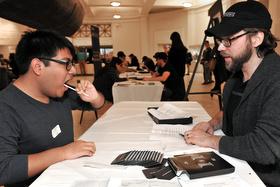
Student swabbing inside of his cheek to collect a sample of his DNA at the New York City Student Ancestry Project's kickoff event held February 3 at the American Museum of Natural History. ©AMNH/D. Finnin
200 students from CCNY and seven other schools provide DNA samples for initiative directed by biology professor Michael Hickerson
Approximately 200 student volunteers from The City College of New York and seven other New York area colleges are participating in The New York City Student Ancestry Project. The project kicked off Monday, February 3, at an event at theAmerican Museum of Natural History (AMNH), where the students provided DNA cheek swabs for National Geographic’sGenographic Project.
The project’s goals are two-fold, explained project director, Dr. Michael Hickerson, CCNY assistant professor of biology. Students will learn in the classroom how to analyze the data from their own genome to reconstruct their ancient family histories and become bioinformatically literate. Additionally, the project will provide a model for public understanding of complex population genetic inference. The project is the public outreach component of a NSF CAREER grant to Professor Hickerson awarded in 2013.
“There is great potential for misunderstanding and misuse of personal genomics as they become more popular and controversial,” he said. “As interpretations of complex pop genetic data transition from the world of research and academia to the purview of the mainstream through low-cost genomics and public databases, public programs such as this are critical.”
Professor Hickerson will reconvene the student volunteers for a follow-up program April 23 at AMNH at which a panel of prominent population geneticists will summarize the results and discuss the merits and limitations. This will be followed by a public event featuring a conversation among scientists and scholars, including Henry Louis Gates Jr., Dorothy Roberts and Spencer Wells.
The Student Ancestry Project is linked to Professor Hickerson’s NSF-supported research to develop computational models that use DNA evidence to reconstruct how communities of species have responded to climate change. His aim is to use thousands of genes from many species at once to test scenarios of how members of ecological communities can synchronously or idiosyncratically expand, contract, move and go extinct as climate change modifies the habitat.
Analyzing the samples obtained from the student volunteers will demonstrate how a relatively small sample of diverse students can reveal both recent and deep histories of the entire human species.
The Genographic Project is a multiyear global initiative that is gathering and analyzing the world’s largest collection of anthropological DNA samples in the hope it will capture an invaluable genetic snapshot of humanity. More than 600,000 people from 130 countries have participated in the project.
About The City College of New York
Since 1847, The City College of New York has provided low-cost, high-quality education for New Yorkers in a wide variety of disciplines. More than 16,000 students pursue undergraduate and graduate degrees in: the College of Liberal Arts and Sciences; the Bernard and Anne Spitzer School of Architecture; the School of Education; the Grove School of Engineering; the Sophie Davis School of Biomedical Education, and the Colin Powell School for Civic and Global Leadership. U.S. News, Princeton Review and Forbes all rank City College among the best colleges and universities in the United States.
MEDIA CONTACT
Ellis Simon
p: 212.650.6460
e:
esimon@ccny.cuny.edu